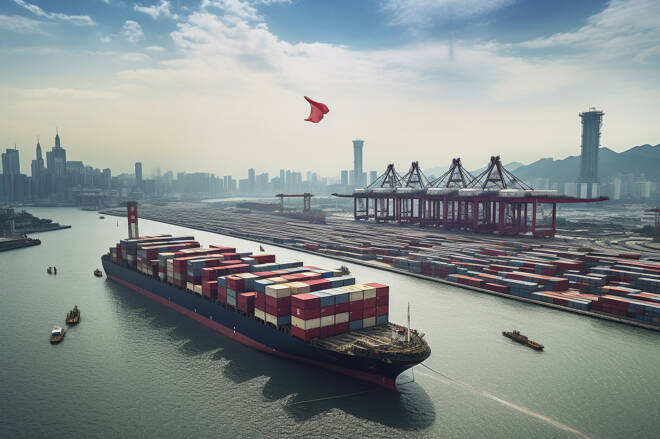Advertisement
Advertisement
US-China Trade War Escalates as Tariffs Climb and Markets Diverge
By:
Key Points:
- US hikes China tariffs to 245%, sparking fears of deeper trade rifts and global economic fragmentation.
- WTO warns US-China decoupling could cut global GDP by nearly 7%, hitting vulnerable economies hardest.
- Fed flags tariffs as a threat to growth; US equities tumble while Hong Kong stocks post YTD gains.
US-China Trade War Heats Up
The US escalated its trade war with China on Wednesday, April 16, announcing new tariffs and launching an investigation into potential levies on imports of critical minerals and their derivative products.
According to a White House press release, potential tariffs could reach 245%, including:
- 125% reciprocal tariffs.
- 20% tariffs targeting the fentanyl crisis.
- Section 301 tariffs on specific goods, ranging from 7.5% to 100%.
- 25% tariffs on aluminum and steel.
The US President has also warned of possible tariffs on pharmaceuticals and a shift to national security tariffs targeting semiconductors and electronics. In a separate move, Trump restricted the sale of Nvidia’s (NVDA) H20 chips to China.
President Trump’s actions followed China’s decision to hike tariffs on US imports to 125%, halting rare earth mineral exports to the US, and calling on airlines to halt Boeing (BA) deliveries.
The World Trade Organization (WTO) Director General Ngozi Okonjo Iweala warned on April 16 of the broader risks, stating:
“I am deeply concerned by the uncertainty surrounding trade policy, including the US-China stand-off. The recent de-escalation of tariff tensions has temporarily relieved some of the pressure on global trade. However, the enduring uncertainty threatens to act as a brake on global growth, with severe negative consequences for the world, the most vulnerable economies in particular.”
The WTO projects a nearly 7% decline in global real GDP over the long term in a worst-case scenario driven by US-China decoupling.
Is the US-China Trade War Isolating the US?
There is growing concern that aggressive US trade policy could backfire. On Thursday, April 17, CN Wire reported:
“Malaysian Prime Minister Anwar Ibrahim stated that amid rising unilateralism, Malaysia is willing to strengthen cooperation with China to jointly address risks and challenges. He emphasized that ASEAN would not endorse any unilateral imposition of tariffs and would enhance collective resilience through cooperation to sustain economic growth.”
China Premier Xi Jinping also had a favorable state visit to Vietnam, reportedly sparking talks of a potential BRICS membership. Strengthened ties with key exporters, including potential inroads with the EU, could help China absorb tariff shocks.
Political commentator Brian Tyler Cohen reacted to a suggestion that Trump has managed to isolate China from the rest of the world, stating:
“There’s reporting now that Japan & South Korea are negotiating trade deals with China… that the EU is eliminating Chinese EV tariffs. I’m concerned with you’re not familiar with which country is being isolated – doesn’t look like it’s China.”
Despite the intensifying US-China trade war, China remains open to negotiations. David Ingles, Chief Markets Editor for Bloomberg TV Asia Pacific, remarked:
“IMO the most important part of the US-China tariff story that unfortunately often goes unnoticed (which is bizarre tbh because China said it multiple times). China’s said (many times) it’s open to negotiations but insists to be treated with respect.”
Economist Shen Jianguang echoed this on Bloomberg TV, stating:
“China is waiting for the US to realize the trade war is also bad for the US economy.”
US-Hong Kong Markets Diverge on Tariffs
On April 16, the US markets tumbled as Fed Chair Powell warned that tariffs could slow growth and fuel inflation. The Dow and the S&P 500 dropped 1.73% and 2.24%, respectively, while the Nasdaq Composite slid 3.07%.
In contrast, the Hang Seng Index gained 1.62% in early trading on Thursday, April 17, taking the year-to-date (YTD) gains to 6.67%. Mainland China equity markets have also fared better than the US markets. The Shanghai Composite Index is down 4.14% YTD despite the escalating trade war. Meanwhile, the Nasdaq Composite has tumbled 15.55% YTD.
Brian Tycangco, editor and analyst at Stansberry Research, commented:
“Hong Kong’s key indices are rallying today even after Wall Street’s big losses overnight. Decoupling takes many forms. This could be the shape of things to come if Beijing is able to sustain growth through stimulus and focus on keeping things stable at home.”
Outlook
Tariff-related developments and Beijing’s policy measures will remain key drivers of sentiment. While tensions may weigh on regional markets, additional Chinese stimulus or a weaker yuan could soften the blow, aiding the country’s pivot to a consumption-led economy.
Stay with us for in-depth coverage of China’s economic trajectory and global market implications.
About the Author
Bob Masonauthor
With over 28 years of experience in the financial industry, Bob has worked with various global rating agencies and multinational banks. Currently he is covering currencies, commodities, alternative asset classes and global equities, focusing mostly on European and Asian markets.
Advertisement
